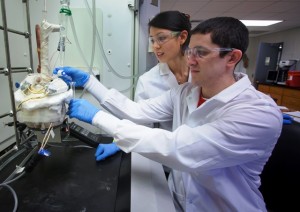The ready availability of fuel is a double-edged sword, says Lindsay Soh, assistant professor of chemical and biomolecular engineering. It has enabled development around the world, but the way fuels are harvested and the rate at which they are consumed are unsustainable.

Professor Lindsay Soh works in her lab with Christopher Verni ’15.
In collaboration with colleagues at Yale and University of Pittsburgh, Soh is searching for alternative fuels with low carbon footprints as well as replacements for chemicals and materials produced with non-renewable feedstocks. Her current project, which evolved out of her doctoral research at Yale, is focused on processing oils, such as those extracted from corn or algae, into biodiesel using carbon dioxide as a solvent.
At elevated pressure and temperature, carbon dioxide has properties similar to other solvents but with the benefits of being benign, readily available, and non-toxic. Soh’s research involves using carbon dioxide to extract lipids from biomass and convert these oils into biodiesel. Her long-term goals involve the use of sustainable technologies for implementation in an integrated biorefinery where fuel and value-added products can be made sustainably from renewable feedstocks.
“Next time you are eating a meal with vegetables from California, grains from Nebraska, and fruits from Mexico, think about how those ingredients got to you,” says Soh. “When you are in your car or on an airplane, think about fuel consumption and the implications of burning the fuel. Next time you drink from a plastic water bottle, get a plastic bag from a grocery store, or even get your flu shot from a disposable plastic syringe, think about what materials it took to produce those goods.
“Now think about where those materials are going at the end of life and what it would be like if we didn’t have access to them. Some changes may be made to the way that these items are consumed, but some have become irreplaceable in society. Biodiesel and renewable liquid fuels can be used directly for transportation needs, and other biomass can be used to replace current solvents and items such as plastics.”
Soh is eager to work with undergraduates in her research and hopes that they carry what they learn in her lab to their next positions, other students, and their communities. Christopher Verni ’15 (Medway, Mass.), a dual major in chemical engineering and Spanish, has been working with Soh as an EXCEL Scholar and plans to transition his work into an honor’s thesis next year. Soh will include more undergraduate research students this summer.
Verni, who plans to attend graduate school after Lafayette, is helping to develop methods for analyzing biodiesel products. They next will turn their attention to optimizing the conversion reaction using carbon dioxide for biodiesel production. Verni also assisted Soh, who joined the faculty this year, with setting up her lab.
“Lafayette’s philosophy of a student body comprised entirely of undergraduates presents students with opportunities that are rare at large universities, which is one of the reasons why I chose the College,” says Verni.
“I was fortunate to be paired with Professor Soh,” he adds. “We work as a team and share the duties of experimentation as well as data analysis and then discuss results before proceeding to new experiments. I’m learning how to use analytical methods more concretely, and I am substantiating lab techniques I’ve learned in other courses.”
